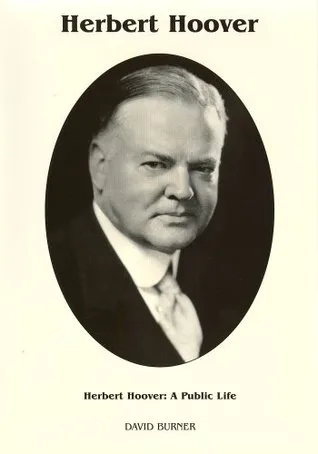Herbert Hoover: A Public Life (Signature)
By (author): "David Burner"
Publish Date:
January 12th 1979
ISBN0945707371
ISBN139780945707370
AsinHerbert Hoover: A Public Life (Signature)
CharactersBernard Baruch, Woodrow Wilson, Herbert Hoover, Henry L. Stimson, Fran
Original titleHerbert Hoover: A Public Life
He was one of the extraordinary Americans of this century. Inexhaustibly energetic, a progressive and a humanitarian, he would build a society on the virtues of hard, intelligent work, voluntary cooperation, commonsensical decency, and good neighborliness. Yet for three decades after he left the presidency Herbert Hoover met with opprobrium and derision, and now his name is almost invariably associated with economic depression and inept leadership. But, as historian David Burner argues in this compellingly readable biography, the conventional view of out thirty-first President is distorted and largely unjust.Hoover's early years were the classic American tradition. Born in Iowa, orphaned by the age of nine, raised by relatives in Oregon, he was in the first graduating class of Stanford University. He spent the next twenty years as a mining engineer and entrepreneur in Australia, China, and England, and quickly became a millionaire. His organizing and supervising of the massive Belgian relief operations of World War I made him an international figure, and he came home to the United States to oversee the wartime production and distribution of food. After the war he led a European relief program that saved millions of lives.Mr. Burner focuses on Hoover's eight years as Secretary of Commerce during the Harding and Coolidge administrations, when he assiduously promoted American economic development. With his enormous prestige and genuine idealism, he campaigned for a more equal distribution of wealth, conservation of natural resources, the eight-hour day, the elimination of poverty, and other social reforms. When he became President in 1929--the first professional engineer to reach the White House--Hoover's standing was at its zenith, and he urged upon Congress a program that was the most socially adventurous proposed in America before Franklin Roosevelt's Hundred Days in 1933.But, as Burner makes clear, there were fatal flaws in Hoover that rendered him unable to deal with the crises following the Wall Street crash of 1929. He shows Hoover as a lonely individualist traveling faithfully along on his own uncommunicative course, who understood the importance of instilling public confidence but could not bring himself to employ public relations techniques to manufacture it. He shows Hoover as a private person who shrank from rough political contacts, who believed he could transcend congressional factions and interests and make decisions like a technician. he shows a Hoover who desired progress but would fail to take into account the subtle components of the whole community. Finally, he shows Hoover as a man who foresaw the country's economic collapse, but whose rational and impersonal approach to social problems was bound to fail. As a result, this exceptional man's reputation essentially rests on the last three years of his beleaguered presidency. Burner's biography should go a long way toward restoring Herbert Hoover to a fairer place in history.
